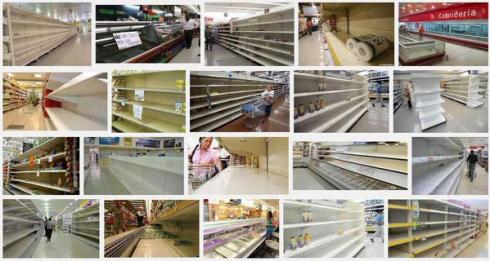
From a different website, here’s a picture from 2014 of people waiting in line to buy food: (posted here under fair use from http://www.businessinsider.com/long-food-lines-are-in-venezuela-2014-2 )
Posted on 03/10/2018 5:49:20 PM PST by grundle
In May 2017, the Washington Post reported:
In a recent survey of 6,500 Venezuelan families by the country’s leading universities, three-quarters of adults said they lost weight in 2016 — an average of 19 pounds… a level of hunger almost unheard-of outside war zones or areas ravaged by hurricane, drought or plague.
In February 2018, Reuters reported:
Venezuelans reported losing on average 11 kilograms (24 lbs) in body weight last year… according to a new university study…
That’s 43 pounds in two years.
Before I explain how this came to happen, I want to start out by explaining what did not cause this to happen.
Many media outlets have been blaming Venezuela’s food shortages on the 2014 collapse in the price of oil. But they are wrong. Other countries whose economies are heavily dependent on oil, such as Norway and Saudi Arabia, do not have food shortages. Furthermore, Venezuela’s food shortages began in 2003, which was 11 years before the price of oil collapsed.
Now, to explain the actual cause of the food shortages.
Hugo Chavez was an incompetent, communist dictator, who wreaked havoc on Venezuela’s ability to produce goods and services.
How do I know that Chavez was a dictator?
Because only a dictator would use the military to seize food from private owners.
How do I know that Chavez was incompetent?
Because only a complete incompetent could create a shortage of gasoline in a country that has some of the world’s biggest oil reserves.
How do I know that Chavez was a communist?
Because only a communist would label toilet paper as a “luxury.”
Hugo Chavez did all of those things, plus a whole lot more.
He set price controls on many things, which, as any Economics 101 student will tell you, cause shortages.
He used the military to seize much of the country’s productive capacity from the private sector. And in each and every one of these cases, productivity under government ownership fell substantially.
Chavez referred to his policies as
“21st century socialism”
By giving it that name, Chavez was implying that his policies would, for some reason that he never explained, have different results than what the same policies had had in the past in other countries.
He was wrong.
Before I get to the many examples of how Chavez’s policies hurt the people of Venezuela, I would like to point out some of the people who praised Chavez’s policies.
Chavez’s policies have been praised by Sean Penn, Oliver Stone, Naomi Campbell, Michael Moore, Don King, Noam Chomsky, and Danny Glover.
Here are plenty of examples of how Chavez’s policy hurt the people of Venezuela:
From 2003 until his death a decade later, Chavez had been setting strict price controls on food, and these price controls caused shortages and hoarding.
In January 2008, Chavez ordered the military to seize 750 tons of food that sellers were illegally trying to smuggle across the border to sell for higher prices than what was legal in Venezuela.
In February 2009, Chavez ordered the military to seize control of all the rice processing plants in the country and force them to produce at full capacity, which they had been avoiding in response to the price caps.
In May 2010, Chavez ordered the military to seize 120 tons of food from Empresas Polar.
In March 2009, Chavez set minimum production quotas for 12 basic foods that were subject to price controls, including white rice, cooking oil, coffee, sugar, powdered milk, cheese, and tomato sauce. Business leaders and food producers claimed that the government was forcing them to produce this food at a loss.
Chavez nationalized many large farms.
During the time that Chavez was president, the government seized more than 10 million acres of farmland from private owners.
Chavez said of this seized farmland:
“The land is not private. It is the property of the state.”
Some of the farmland that had been productive while under private ownership became idle under government ownership, and some of the farm equipment sat gathering dust. As a result, food production fell substantially.
One farmer, referring to the government officials overseeing the land redistribution, stated:
“These people know nothing about agriculture.”
Chavez seized many supermarkets from their owners. Under government ownership, the shelves in these supermarkets were often empty.
In 2010, after the government nationalized the port at Puerto Cabello, more than 120,000 tons of food sat rotting at the port.
In May 2010, after price controls caused shortages of beef, at least 40 butchers were arrested, and some of them were held at a military base and strip searched by police.
Chavez’s price controls caused shortages of materials used in the construction industry.
Chavez nationalized key industries, including telephone, electricity, steel, and cement.
As a result of Chavez’s nationalizations of the steel and cement industries, production fell substantially. Nationwide production of steel rods declined 20 percent in September 2010 compared with a year earlier. Cement output fell 40 percent in the second half of 2009. These shortages caused new housing construction in 2010 to fall to less than half that of the previous year.
In 2010, the government’s mismanagement of the nationalized oil industry was so severe that the country actually had to import gasoline, despite having some of the hugest oil reserves in the world.
Also in 2010, the government’s mismanagement of the nationalized electricity industry caused shortages of electricity.
In December 2006, the Venezuelan government instituted a 15% tax on imported toilet paper, which it described as being a “luxury.”
Chavez shut down a private TV station that had criticized him.
Because of Chavez’s criticism and legal attacks against the productive members of his country, the country experienced a substantial brain drain. Doctors, teachers, entrepreneurs, business owners, software developers, advertising account executives, scientists, classical musicians, and lawyers fled the country.
Of this brain drain, Investor’s Business Daily wrote:
“Chavez talks a lot about Venezuela being a rich country, and extols its vast oil wealth. But the human capital he is throwing out is far more valuable… He’s throwing away his country’s biggest treasure.”
Chavez died in March 2013. The country’s new president, Nicolas Maduro, continued Chavez’s policies. ABC News referred to Maduro as
“… Chavez’s handpicked succesor… “
By the time Chavez died, he had nationalized more than 10 million acres of farmland.
The Communist Manifesto by Karl Marx and Friedrich Engels states:
“… the theory of the Communists may be summed up in the single sentence: Abolition of private property.”
In 2015, Bernie Sanders said Chavez was
“… a dead communist dictator… “
By comparison, the so-called “democratic socialist” countries of western Europe do not use their militaries to seize farmland or privately owned businesses. While they do sometimes use eminent domain for certain very specific and limited projects, they do not do anything that comes even remotely close to what Venezuela has been doing. So despite the label of “socialism” that many people use for these western European countries, it would be more accurate to refer to them as “mixed economies.” While they do have high taxes and very generous welfare states, they also have strong, healthy private sectors, and very strong protection of private property rights.
In 2015, the Venezuelan military stationed troops in supermarkets, where they told customers not to take pictures of empty shelves. But that didn’t stop people from doing it. During the first week of 2015, the Twitter hashtag #AnaquelesVaciosEnVenezuela (“Empty shelves in Venezuela”) listed more than 200,000 tweets.
For example: (posted here under fair use from https://twitter.com/Indiferencia/status/551547489565016064/photo/1 )

From a different website, here’s a picture from 2014 of people waiting in line to buy food: (posted here under fair use from http://www.businessinsider.com/long-food-lines-are-in-venezuela-2014-2 )
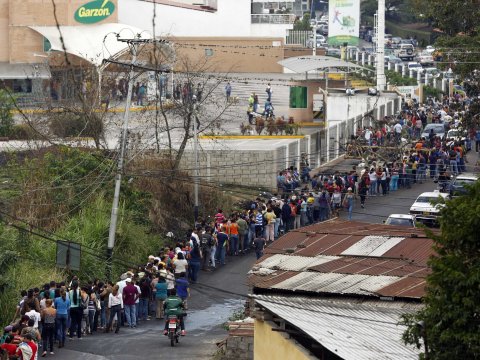
This video from 2015 is called “Venezuela’s Chaos: Every day is like Insane Black Friday”
https://www.youtube.com/watch?v=isO52VeBUaQ
Like all communist countries, Venezuela has managed to achieve a long term, widespread, chronic shortage of toilet paper. Venezuela’s toilet paper shortages have been reported on by NPR, CNN, the Washington Post, the New York Times, the BBC, the Atlantic, Forbes, Slate, Reason, the Telegraph, Investor’s Business Daily, USA Today, NBC, and the New Yorker. First, the government set price controls on toilet paper, which created the shortages. Afterward, in 2013, the government used military troops to seize a toilet paper factory. Three years later, in 2016, the government seized a second toilet paper factory.
In November 2013, Maduro had the government seize the Daka chain of electronics stores, which sold televisions, washing machines, and air-conditioners. Maduro accused the chain of overcharging, and said it would now have “fair prices.” Maduro said, “We’re doing this for the good of the nation. Leave nothing on the shelves, nothing in the warehouses!” Other electronics stores that were already being run by the government also had lower prices, but they also had frequent shortages, and Maduro never explained how the Daka stores would be able to afford to restock their merchandise after it was sold at these new, lower prices.
In February 2015, Maduro used the military to seize the Dia a Dia chain of supermarkets and the Farmatodo chain of pharmacies. Maduro blamed both chains for causing shortages, and had their directors and executives arrested.
In September 2016, CNN wrote the following about a Venezuelan citizen who cried when she visited the U.S. and saw well stocked shelves at a supermarket:
Venezuela crisis: I flew to U.S. to buy toilet paper
Carmen Mendoza came to New York to visit her daughter Anabella — and also to buy toilet paper, soap, toothpaste, beans, corn flour, tuna fish, mayonnaise and aspirin.
Mendoza, 66, can’t find these basic goods in her home country: Venezuela.
Just half a block away from her daughter’s Brooklyn apartment, a new Whole Foods recently opened and Anabella told her mom check it out. Mendoza fought back tears when she saw fully stocked food shelves and lush vegetables and fruits, a rare sight in Venezuela today.
“My eyes got wet,” Mendoza says, becoming emotional recounting the Whole Foods visit. In Venezuela, “You are so happy when you find something as basic as milk.”
In 2016, the New York Times published the following:
Dying Infants and No Medicine: Inside Venezuela’s Failing Hospitals
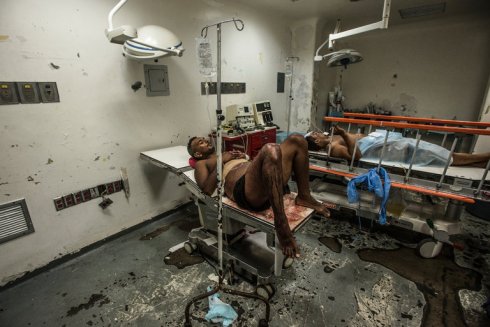
By morning, three newborns were already dead…
… chronic shortages of antibiotics, intravenous solutions…
Doctors kept ailing infants alive by pumping air into their lungs by hand for hours. By nightfall, four more newborns had died…
Gloves and soap have vanished from some hospitals…
… there was not enough water to wash blood from the operating table…
The rate of death among babies under a month old increased more than a hundredfold in public hospitals run by the Health Ministry…
The rate of death among new mothers in those hospitals increased by almost five times in the same period…
… two premature infants died recently on the way to the main public clinic because the ambulance had no oxygen tanks. The hospital has no fully functioning X-ray or kidney dialysis machines… some patients lie on the floor in pools of their blood…
… people are dying for lack of antibiotics…
… without water, gloves, soap or antibiotics, a group of surgeons prepared to remove an appendix that was about to burst, even though the operating room was still covered in another patient’s blood…
… the rotting mattress had left her back covered in sores…
The pharmacy here has bare shelves…
In 2015, photographs from Venezuela showed that price controls on food were being enforced by a military police state. The Wall St. Journal published the following:
Venezuela’s Food Shortages Trigger Long Lines, Hunger and Looting
Violent clashes flare in pockets of the country as citizens wait for hours for basics, such as milk and rice
Shoppers wait in a long line to enter the “Latino supermarket” in the Dr. Portillo area of Maracaibo, Venezuela, on August 12.
Shoppers have their fingerprints scanned while buying government-controlled corn flour at the “Latino Supermarket” in Maracaibo to prevent them from coming back for another ration.
National Guard soldiers stand guard in Maracaibo over bags of food confiscated from people who illegally sought to contraband state-controlled food goods for higher prices.
National Guard soldiers guard food confiscated from people who sought to sell it for more than the government-set prices.
A National Guard soldier leads detainees accused of illegally selling contraband state-controlled food goods in Maracaibo on Aug. 13.
In 2016, Venezuela arrested a private business owner because he had managed to acquire enough toilet paper to properly stock his employees’ bathrooms. A labor union at the private business had a clause in its contract which said that the bathrooms must always have toilet paper. I agree with the union on that clause. Since price controls caused a shortage of toilet paper, the only way the employer could get enough toilet paper was to illegally buy it on the black market for a price that was higher than the government controlled price. So the government accused the business owner of “hoarding,” and he could end up going to jail for it. Interestingly, the same news article also said that the government might have seized his business if he had not properly stocked the employees’ bathrooms with toilet paper. Darned if you do, and darned if you don’t!
In 2016, some parents made their children skip school so they could spend all day waiting in line for food at the supermarket.
In 2015, the Pan Am Post wrote:
What Seven Hours of Waiting Will Get You in Venezuela
… organizers had announced that meat, fish, deli meats, and chicken would be available. She arrived at 6 in the morning, was given number 250, and waited in line for seven hours…
Placards with photos of presidents Hugo Chávez and Nicolás Maduro posted at the entrance say: “If it wasn’t for them, this sale would not have been possible.”
The same is going on inside. There is not a single square meter in the crumbling warehouse that doesn’t show either a picture of Chávez and Maduro, a quote from Chávez, or a picture of Chávez with Fidel Castro…
… there’s no meat, or sausage, or chicken, and no corvina or snapper, the only good white fish. Instead we must settle for mackerel and sardines…
… once you enter the warehouse there is no direct access to shopping. Instead there is a new group of chairs…
… animosity clearly sets in among most, when they see what they can buy: ugly, green potatoes (one kilo per person, hand picked by the person handing them to you); carrots (about the same); some tomatoes that cause a reaction somewhere between repulsion and shame…
The peppers are shamefully small. I get three micro-peppers, no more.
I can also get juices and oatmeal drinks (not milk, which is scarce)…
Raúl Castro used to say “each day, Venezuela and Cuba are becoming more and more the same.” That was in 2010, and even the most feverish mind could not have imagined an experience like the one I had on a Saturday morning. But he was telling the truth. If this is what socialism can offer, we are going to starve.
People begin to show their anger, but in a low grumble: “this is no good,” “I can’t have lost a morning for this.”
… a certain lady said to me: “30 years ago, there was a supermarket here, and you could choose what you wanted and pay cheap for it.”
Editor’s note: the author of this article expressly asked not to be named for fear of reprisals.
This video from 2016 shows empty shelves at a Venezuelan supermarket:
https://www.youtube.com/watch?v=AtMODsO2NZ4
In 2016, Amnesty International wrote:
Venezuela: New regime effectively amounts to forced labour
A new decree establishing that any employee in Venezuela can be effectively made to work in the country’s fields as a way to fight the current food crisis is unlawful and effectively amounts to forced labour, said Amnesty International.
“Trying to tackle Venezuela’s severe food shortages by forcing people to work the fields is like trying to fix a broken leg with a band aid,” said Erika Guevara Rosas, Americas Director at Amnesty International.
“The new decree completely misses the point when it comes to findings ways for Venezuela to crawl out of the deep crisis it has been submerged in for years. Authorities in Venezuela must focus on requesting and getting much needed humanitarian aid to the millions in need across the country and develop a workable long term plan to tackle the crisis.”
The decree, officially published earlier this week, establishes that people working in public and private companies can be called upon to join state-sponsored organizations specialized in the production of food. They will be made to work in the new companies temporarily for a minimum of 60 days after which their “contracts” will be automatically renewed for an extra 60-day period or they will be allowed to go back to their original jobs.
In 2016, people were waiting in line for up to 12 hours to buy food, and police threatened to arrest a BBC reporter if he did not erase his video footage of these people waiting in line.
In 2016, some Venezuelans made a 36 hour round trip to Brazil just to go grocery shopping.
In 2016, some Venezuelan children starved to death.
This video from 2016 is called “A growing, catastrophic food crisis sows unrest in Venezuela”
https://www.youtube.com/watch?v=yJApHJAkGG8
During one weekend in June 2016, the government arrested more than 3,800 people for trying to wait in line outside a supermarket.
In 2016, people waited in line for five hours for just one pound of bread.
In 2016, the following pictures of starving prisoners were smuggled out of a prison in San Juan de los Morros, in Guarico. (Posted here under fair use from https://www.thesun.co.uk/news/1947080/harrowing-images-smuggled-out-of-venezuelan-jail-reveal-emaciated-prisoners-left-starving-to-death/ )
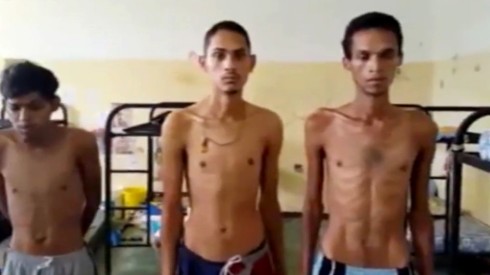
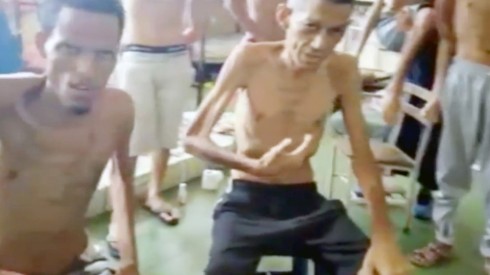
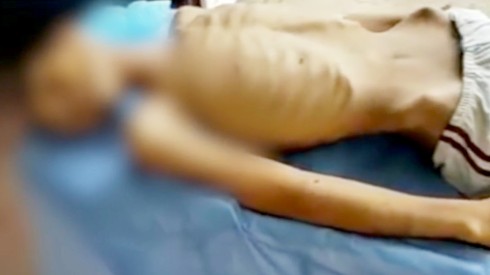
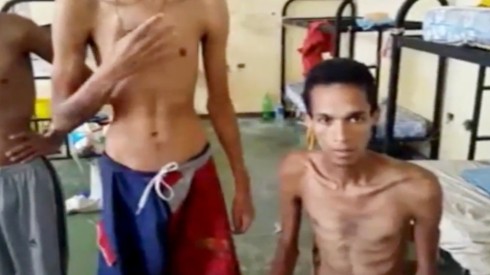
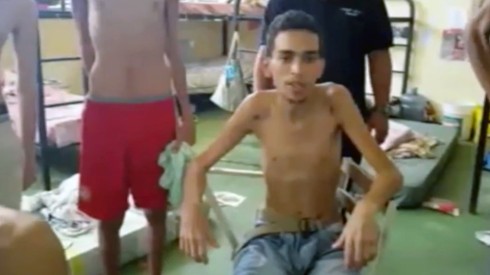
In May 2017, the Washington Post wrote:
Venezuela’s disaster is man-made, economists point out — the result of farm nationalizations, currency distortions and a government takeover of food distribution. While millions of Venezuelans can’t get enough to eat, officials have refused to allow international aid groups to deliver food…
“It’s not only the nationalization of land,” said Carlos Machado, an expert on Venezuelan agriculture. “The government has made the decision to be the producer, processor and distributor, so the entire chain of food production suffers from an inefficient agricultural bureaucracy.”
… Chávez accelerated the nationalization of farms, eventually seizing more than 10 million acres. The government expropriated factories, too, and Venezuela’s domestic food production plummeted…
Instead of spurring growth in domestic agriculture, the government has strangled it, farmers say. Domestic production of rice, corn and coffee has declined by 60 percent or more in the past decade… Nearly all of the sugar mills nationalized by the government since 2005 are paralyzed or producing below capacity…
The price controls have become a powerful disincentive in rural Venezuela. “There are no profits, so we produce at a loss,” said one dairy farmer in the state of Guarico, who spoke on the condition of anonymity because he feared retaliation from authorities…
According to Vicente Carrillo, the former president of Venezuela’s cattle ranchers’ association, the overall size of the country’s herd has dropped in the past five years from 13 million head to about 8 million.
In May 2017, the government banned international and humanitarian aid groups from bringing medical supplies such as first aid kits, eye drops, antacids, gauze, surgical tape, and burn cream into the country, and tried to justify this ban by falsely claiming that these medical supplies were actually “war materials.”
In August 2017, ABC News reported:
Hungry Venezuelans turn to Colombia for a plate of food
Under a scorching sun just a short walk from Colombia’s border with Venezuela, hundreds of hungry men, women and children line up for bowls of chicken and rice – the first full meal some have eaten in days…
… they are coming to eat in one of a half-dozen facilities offering struggling Venezuelans a free plate of food…
On an average day, 2,000 Venezuelans line up for meals, getting a ticket to reserve their spot and then waiting four hours for a meal served at outdoor plastic tables.
Workers stir gigantic metal pots filled with chicken and rice… Adults sit quietly, savoring their bowl of food…
In September 2017, women who had been previously employed as doctors and teachers were currently working as prostitutes because it was the only way they could obtain food to feed their families.
In December 2017, the New York Times reported that even though large numbers of babies and children were starving to death, the government was telling doctors and hospitals not to list starvation as their official cause of death. In addition, the Times kept track of 21 pubic hospitals over a period of five months. During that time period, the Times was unable to get any kind of official starvation counts from any of those hospitals. However, doctors at nine of those hospitals told the Timed that they had kept at least a partial count, and that of these partial counts at nine hospitals, nearly 400 children had starved to death. The cause of these deaths was not listed as starvation in the hospitals’ official records, but the doctors knew that starvation was their true cause of death. The Times also reported that the food shortages were so severe that even most hospitals did not have enough baby formula to meet the needs of their patients. And it wasn’t just food that was in short supply. The Times also reported that many of these hospitals did not have enough of basic supplies such as soap, syringes, gauze, diapers, and latex gloves.
Back in 2003, when I first read that Hugo Chavez had set price controls on food, I knew that if he continued with the price controls long enough, this was bound to happen. Price controls lead to shortages. Either you acknowledge your mistake and get rid of the price controls, or you continue the price controls and ultimately end up adopting a totalitarian dictatorship in order to enforce those price controls. In the long run, price controls on food will always lead to government seizures of the country’s productive capacity. This is exactly how it ended up in the countries that did this during the 20th century. The results of Chavez’s “21st century socialism” were no different. Anyone who thought the results would be different is a fool. The celebrities who praised Chavez are fools. The social justice warriors who praised Chavez are fools.
Want to save the people of Venezuela? Here’s what do to: Abolish all of the price controls, and do so immediately – overnight. Also get rid of all of the country’s currency controls. Let the private sector determine currency exchange rates, with no government interference. Stop printing any more worthless bolivars. Let people use whatever currency they want, whether it be the U.S. dollar, the euro, the yen, or anything else. Return the farms, food processing plants, supermarkets, factories, businesses, and stores to their private owners. Do all of these things, and do them immediately. Don’t wait a year, or two years, or five years. Do it immediately. And do it now.
Please, please, please show this to anyone you know who thinks that "socialism" is a good idea.
The Burn should try this diet for a year.
Please find a way to send this to that college chickie who said all she wanted was “Socialism Now”.
So should Michael Moore.
We should have the snowflakes who want socialism to be put on this diet.
Michelle Obama’s school lunch food racket program.
Global Warming Bs is a similar Hope and Change program of submission for carreer and privilege promises.
Socialism/Nazism, that is. I mean the Hope and Change algorithm of demanding submission in exchange for mere promises of successful carreer (as a traitor who uses starvation to get compliance) is a die in the wool Leninist fascism.
Don’t even whisper the truth about Socialism or the snowflakes will cry. If I’m correct I think the majority or at least forty something percent of college students want socialism
Actually, I quoted Bernie Sanders calling Hugo Chavez a “dead communist dictator.” Sanders supports the policies of western Europe, not Venezuela.
“” “” Sanders supports the policies of western Europe, not Venezuela.”” “”
That sort of the left admires Scandinavian model above all.
Which is not flawless to start with and also works based on some sort of cultural ethics not present in Venezuela, East Europe or the United States.
I lived in Venezuela in the early seventies. Life was good and any damn food you wanted was in abundance it the stores. There was poverty but not much. There was no hunger. Repeat, THERE WAS NO HUNGER! Even the poor were well fed and some were fat.
In those days Venezuela had the highest standard of living in South America.
The common thread among the left is Venezuela’s problems are a result of falling oil prices. That is a lie. The price of Venezuelan Crude when I left Venezuela was 50 dollars as based on inflation adjusted dollars. Today that same crude is about 55 inflation adjusted dollars. Venezuela sits on the worlds largest oil reserves and its people are starving. This is communists at work.
Oil production in Venezuela has fallen greatly when the government took over (stole) the international oil companies property and leases.
In the 70s I was part of that oil exploration and production. We had the best of the best from around the world be they American, Brit, Aussie, Mexican, Venezuelan etc. They paid us well and we found and produced oil and Venezuela was prosperous.
Communism via Chavez and Maduro has killed Venezuela! When the final revolution occurs I would not be surprised to see Western Venezuela ally itself with Columbia.
When the Venezuelan military temporarily ousted Chavez, what, 15 years ago, it should have been helicopter-ride time.


Great detailed article! I’m currently in Colombia and encounters Venezuelans daily. The Colombians are tolerant of them but their patience is running low now. There is an estimated 2-3 million here and that’s taking a toll on the economy.
Keep the stories coming and I’ll add first hand accounts.
Looks like the north korean diet plan. So sad.
Thanks!
Disclaimer: Opinions posted on Free Republic are those of the individual posters and do not necessarily represent the opinion of Free Republic or its management. All materials posted herein are protected by copyright law and the exemption for fair use of copyrighted works.